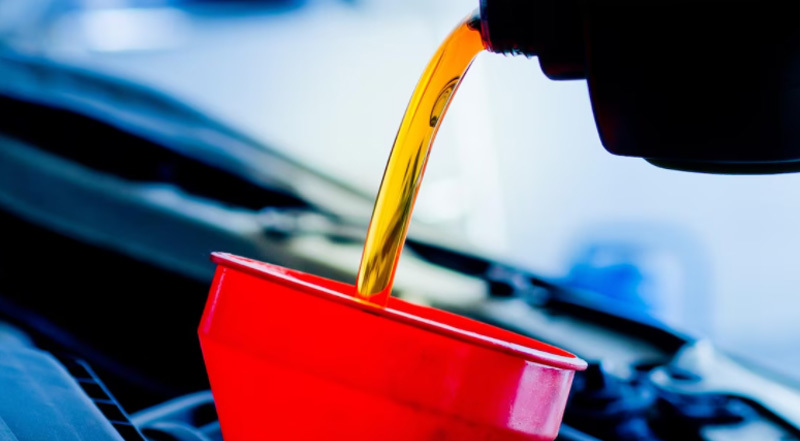
The first national standard of methanol gasoline pilot flight is to be issued
Release time:
2019-08-12
Gasoline and diesel will also become low-carbon. Recently, the Ministry of Industry and Information Technology designated a high proportion of methanol-gasoline vehicle manufacturers and made it clear that the methanol-gasoline pilot will be launched in Shanghai, Shaanxi and Shanxi from May 2011, and the pilot phase will continue until 2013. At the same time, the official website of the Ministry of Finance announced on December 24 that the state would exempt the consumption tax on pure biodiesel produced from waste animal and vegetable fats, and the production enterprises that had paid the consumption tax since January 1, 2009 would be refunded.
Gasoline and diesel will also become low-carbon. Recently, the Ministry of Industry and Information Technology designated a high proportion of methanol-gasoline vehicle manufacturers and made it clear that the methanol-gasoline pilot will be launched in Shanghai, Shaanxi and Shanxi from May 2011, and the pilot phase will continue until 2013. At the same time, the official website of the Ministry of Finance announced on December 24 that the state would exempt the consumption tax on pure biodiesel produced from waste animal and vegetable fats, and the production enterprises that had paid the consumption tax since January 1, 2009 would be refunded.
Nandu reporter learned from a comprehensive interview that the pilot project of the Ministry of Industry and Information Technology will solve the controversial issues of the corrosivity of methanol gasoline and vehicle modification, and may introduce standards to facilitate promotion. If safety and environmental protection can be ensured, methanol gasoline can be used as a supplement to China's petroleum strategy. Refining biodiesel with "waste oil" and "gutter oil" is undoubtedly a good way to recycle, but the recovery management of "gutter oil" and the sales of biodiesel still need supporting policies.
Methanol gasoline can reduce consumption by more than 7%
Recently, the Ministry of Industry and Information Technology organized a meeting to make it clear that methanol gasoline will be piloted. The Ministry of Industry and Information Technology has designated three enterprises, namely Shanghai Huahan, Chery sedan and FAW Jinye, as the production enterprises of high proportion methanol gasoline vehicles. The pilot work has been launched in Shanghai, Shaanxi and Shanxi since May 2011, and the pilot phase will continue until 2013. This is the first time that the pilot work of methanol gasoline promotion is led at the national level, which also means that the promotion of methanol gasoline will be accelerated.
The data shows that the fuel consumption of vehicles using methanol gasoline can be reduced by more than 7% compared with that of traditional gasoline. Due to sufficient combustion, carbon monoxide and hydrocarbons in tail gas are reduced by 50% - 90%. In 2007, methanol fuel and dimethyl ether were identified by the National Development and Reform Commission as the transitional alternative fuel for vehicles in the next 20 to 30 years. However, there are many disputes about methanol gasoline, and there is great resistance to its promotion. Before that, Shanxi Province had tried methanol gasoline in the province, and some automobile after-sales service reported that methanol is highly corrosive, It is easy to damage the automobile engine and cause failure. In addition, some people are worried that the use of methanol gasoline may emit some tail gas that does not even meet the judgment standards and test method standards, mainly formaldehyde, methanol, etc., which may cause adverse effects on the environment and human body.
Lin Boqiang, China Energy Economics Research Center of Xiamen University, told Nandu reporters that the pilot project of the Ministry of Industry and Information Technology should solve the above problems, see how toxic, corrosive and economical methanol gasoline is, and decide whether to promote it and establish standards for promotion. Lin Boqiang analyzed that methanol gasoline should be more economical than gasoline if the problem of corrosion and exhaust emissions of methanol gasoline can be solved technically. But is methanol gasoline suitable for all cars? Does the engine and other components of ordinary cars need to be modified? How much does the modification cost? All these issues should be considered.
In Lin Boqiang's view, methanol gasoline can be used as a supplement to China's petroleum strategy if it can ensure safety and environmental protection. At present, gasoline is mainly used in the world, but Sweden, Germany and other countries have largely promoted the use of methanol gasoline. If the promotion is determined, the Ministry of Industry and Information Technology needs to prepare for the introduction of standards. Research shows that the use of low proportion methanol gasoline does not change the structure of the engine, but it needs to solve many problems such as additives and corrosion, while the high proportion of methanol gasoline requires major improvements in the fuel supply system, heating system, transmission, etc. of traditional gasoline engines. Therefore, if methanol gasoline is promoted after the completion of the pilot, specific standards must be issued by the state, including the proportion of methanol added, the price, and the applicable model. According to insiders, the national standard of M15 Methanol Gasoline for Vehicles is expected to be released and implemented in the first half of 2011.
Exemption from consumption tax alone will not lead to an investment boom
Coincidentally, diesel is also available. The official website of the Ministry of Finance announced on December 24, 2010 that the state will exempt the consumption tax on pure biodiesel produced from waste animal and vegetable fats, and the production enterprises that have paid the consumption tax since January 1, 2009 will be refunded. It is reported that biodiesel refers to the renewable diesel fuel that can replace petrochemical diesel made by animal and vegetable fats and methanol (or ethanol) under the action of catalyst. At present, the main raw materials for domestic production of biodiesel are waste animal and vegetable oils, including "waste oil" from the oil industry and waste cooking oil, namely "gutter oil".
"With the exemption of consumption tax, the production enterprises can save 900 yuan per ton of costs." Sun Shanlin, deputy secretary of the National Biodiesel Industry Cooperation Group, said in an interview with the media, "However, it is difficult to trigger an investment boom solely by the exemption of consumption tax." Sun Shanlin said that the development of biodiesel also requires other supporting policies, such as management, sales, and the recycling management of gutter oil.
Lin Boqiang, director of the China Energy Economics Research Center of Xiamen University, told Nandu reporters that the development of biodiesel in China has been restricted by raw materials. At present, the quality of waste oil processing in China is uneven, and the biodiesel produced often contains impurities, which affect the use, and is only used as a supplement to diesel oil.
According to the data, in 2005, the low price of international crude oil and animal and vegetable fats, as well as the development trend of biodiesel in Europe, led to a large number of domestic production of biodiesel, and the production capacity of biodiesel increased from zero to about 3 million tons. By 2007, the rise of international crude oil prices had led to a sharp rise in the prices of edible oils and industrial oils, and the vast majority of biodiesel enterprises had been closed. Since 2007, China's biodiesel industry has been at a low ebb.
In terms of production, China's biodiesel production is about 400000 tons at present. In terms of biodiesel production enterprises, "there are only a few biodiesel enterprises with a real annual output of 20000 to 30000 tons." The above experts said, "even these few factories, their products are far from the requirements of the national standard".






